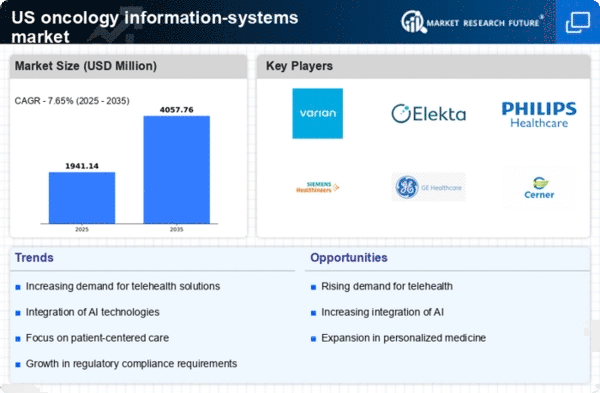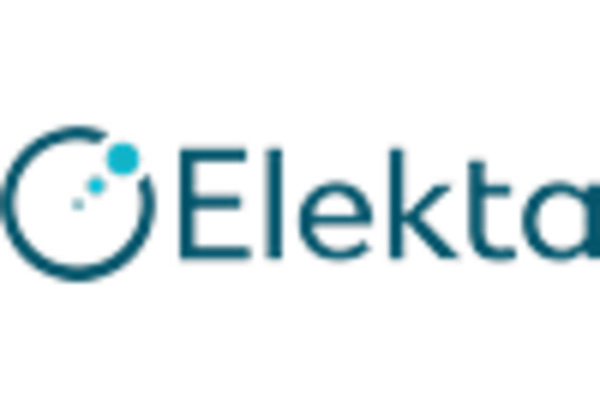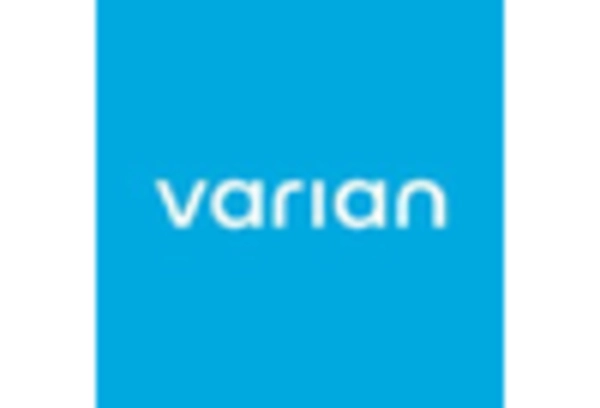Rising Cancer Incidence Rates
The oncology information-systems market is experiencing growth due to the increasing incidence of cancer in the US. According to the American Cancer Society, approximately 1.9 million new cancer cases are expected to be diagnosed in 2025. This rising trend necessitates advanced information systems to manage patient data, treatment plans, and outcomes effectively. As healthcare providers seek to enhance their capabilities in cancer care, the demand for sophisticated oncology information systems is likely to rise. These systems facilitate better data management, improve patient outcomes, and streamline workflows, thereby becoming essential tools in oncology practices. The growing patient population requiring oncology services is a significant driver for the expansion of the oncology information-systems market.
Growing Demand for Patient-Centric Care
The oncology information-systems market is increasingly driven by the demand for patient-centric care. Patients are becoming more involved in their treatment decisions, leading to a need for systems that provide comprehensive information about their conditions and treatment options. Oncology information systems that facilitate patient engagement, education, and communication are gaining traction. This shift towards patient empowerment is prompting healthcare providers to adopt systems that enhance the patient experience. As a result, the market is likely to see a rise in solutions that prioritize patient needs, ultimately improving satisfaction and outcomes in oncology care.
Technological Advancements in Healthcare
Technological innovations are transforming the oncology information-systems market. The integration of advanced technologies such as cloud computing, big data analytics, and machine learning is enhancing the capabilities of oncology information systems. These technologies enable healthcare providers to analyze vast amounts of patient data, leading to more personalized treatment plans and improved patient care. The market is projected to grow as these technologies become more accessible and affordable. For instance, the adoption of cloud-based solutions is expected to increase by 30% in the next few years, allowing for better data sharing and collaboration among healthcare professionals. This trend indicates a shift towards more efficient and effective oncology information systems.
Regulatory Support and Funding Initiatives
Government initiatives and regulatory support play a crucial role in the oncology information-systems market. The US government has been actively promoting the use of health information technology through various funding programs and incentives. For example, the Health Information Technology for Economic and Clinical Health (HITECH) Act has provided substantial financial support to healthcare organizations for adopting electronic health records and related systems. This regulatory environment encourages the development and implementation of oncology information systems, as providers seek to comply with standards and improve care delivery. The infusion of funds into healthcare IT is likely to bolster the oncology information-systems market, making it a vital area for investment.
Increased Focus on Data Security and Privacy
Data security and privacy concerns are becoming paramount in the oncology information-systems market. With the rise of cyber threats and data breaches, healthcare organizations are prioritizing the protection of sensitive patient information. Regulatory frameworks such as the Health Insurance Portability and Accountability Act (HIPAA) mandate strict compliance regarding patient data handling. Consequently, oncology information systems that incorporate robust security features are in high demand. The market is expected to grow as providers seek solutions that not only enhance operational efficiency but also ensure the confidentiality and integrity of patient data. This focus on security is likely to shape the future landscape of the oncology information-systems market.
















